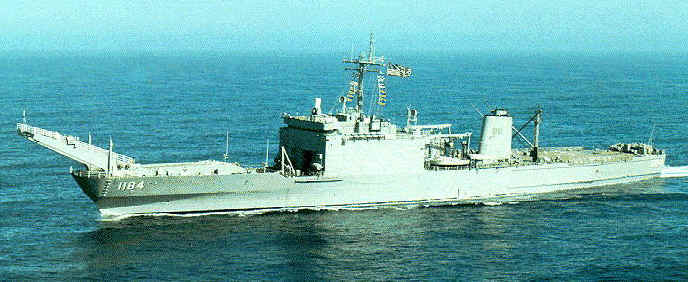Soldiers can operate in austere environments for a month until morale begins to plummet from a lack of decent food, small personal items, and entertainment. During Operation DESERT SHIELD in 1990 in Saudi Arabia, soldiers and marines were positioned in remote, desert camps for months and morale fell apart. Marine Commandant General Al Gray addressed this problem with: "You will have high morale because I say you will have high morale." Marines were not amused. The US military has continued its harsh Saudi Arabian policy of no alcohol and no local liberty in the Balkans and Iraq. A lack of recreation and good food leads to short tempers, accidents, destroys morale, lowers combat readiness, causes incidents, and hurts reenlistments.
Generals should should not wait for morale to collapse before essential human needs are provided. Whenever soldiers deploy on a contingency mission that will last over a month a "Liberty ship" should be deployed. This would be a small amphibious or shallow-draft cargo ship loaded with fresh food, exchange items, a dozen recreation, exchange, and club personnel, and a hundred female USO volunteers. Any type of ship can be used, but retired LSTs are ideal since they require small crews and have a shallow draft allowing them to stop anywhere near shore. Four US Navy LSTs are in the inactive reserve fleet as wartime assets. The US military should recommission four LSTs and overhaul them for another 20 years of service as "Liberty ships."

Once a Liberty ship arrives, the fresh bulk food is transferred to mess units ashore and the ship is set up as a large exchange. Groups of soldiers come aboard to shop for candy, chips, cookies, batteries, socks, razors, toothpaste, magazines, sunglasses, ect. The exchange includes a barber shop, post office, check cashing, a cafeteria, ATMs, field uniform sales, a book store, a gym, video games, an ice cream parlor, and a barbecue pit topside. Internet connections (or just e-mail) and satellite telephones may be available. Soldiers can enjoy hot showers and air conditioning in regions where they are uncommon ashore.
As most of the exchange sells out, the empty space is utilized for entertainment. Basketball hoops and ping-pong tables are brought out and movies are shown. The wardroom becomes an officer's bar, the chief's mess becomes a "Top 3" enlisted bar, and a large enlisted club with music and drinks opens in the cargo hold. Visiting units are required to assign a few NCOs for "shore patrol," in this case "ship patrol" to keep the peace. After a couple of weeks, the ship will run out of supplies and return home to load up for the next trip. As an added benefit, LST Liberty ships could still be used as amphibious ships if needed.
Liberty ships would have been very busy during deployments to the Persian Gulf as well as Somalia, Haiti, and Albania. They can deploy within two weeks without the need to spend millions of dollars and send thousands of people to build and run recreational base camps. Liberty ships anchored offshore are safe from terrorists, do not offend host nations (like dancing and alcohol in Arab countries), and prevent security breaches (like in Vietnam, Lebanon, and Iraq). Now that the US military has embarked on a lengthy campaign in the Middle East, Liberty ships are needed more than ever. Liberty ships may also entertain crews of Navy task forces that are committed to an area and unable to make port calls for several weeks.
The US Navy needs to form a planning group to draw up details with mess halls, clubs, MWR, the exchange and commissary system, and the USO to allow Liberty ships to rapidly deploy. These organizations were created to support servicemen deployed to remote areas. They should welcome an opportunity to take part in real world missions to help maintain the combat readiness of American soldiers deployed away from home.
©2015 www.G2mil.com